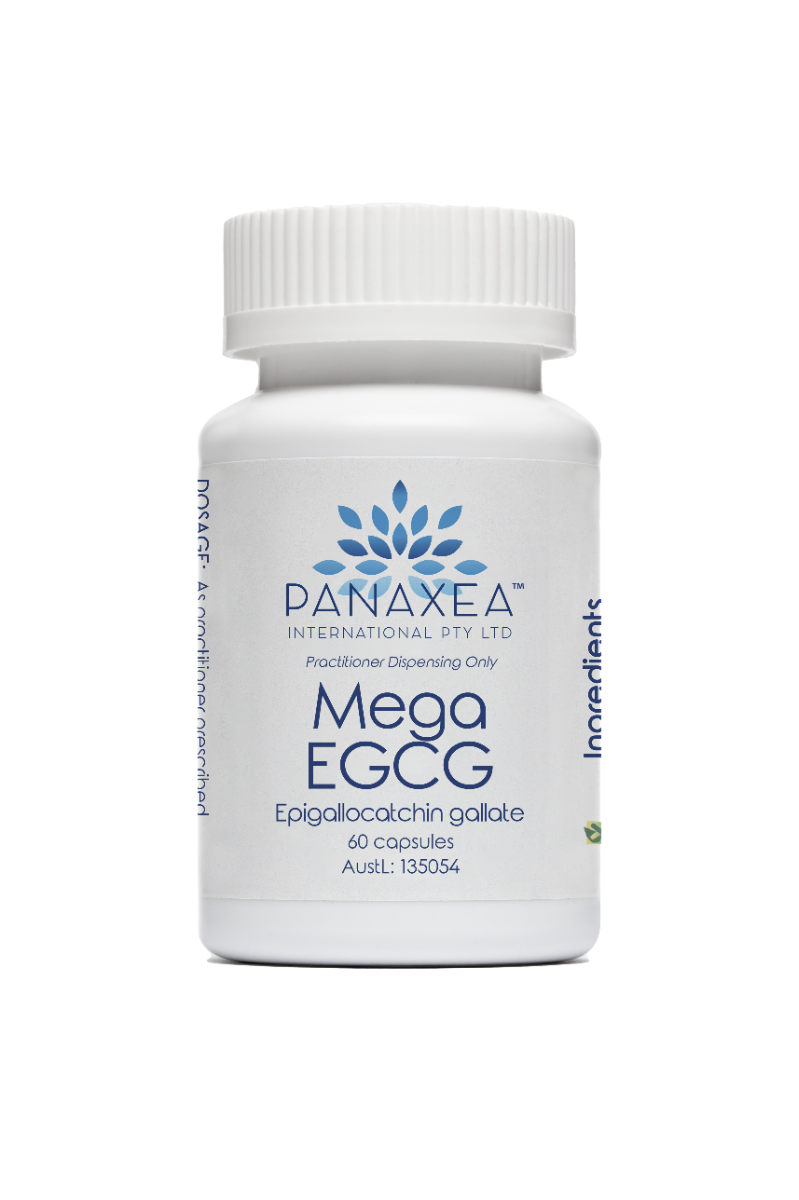
Mega EGCG
Mega EGCG provides a high dose extract of epigallocatechin-3-gallate (EGCG). EGCG possesses significant effects in Neurodegenerative diseases by attenuating inflammation, abnormal accumulation of fibrous proteins, elevated pro-apoptotic proteins, and oxidative stress.
Ingredients |
||
|---|---|---|
| Camelia Sinensis (Green Tea) (standardized to 45% EGCG equiv. 225mg) | ||
Other Ingredients: Vegetable cellulose (hypromellose); Vegetable Stearic Acid; Microcrystalline Cellulose and Vegetable Magnesium Stearate.
Does Not Contain:Wheat, gluten, soy, milk, eggs, fish, crustacean shellfish, tree nuts, peanuts
MEGA EGCG
60 x 500 mg Capsules
Actions
Anti-oxidant
Nootropic
Neuroprotector - regenerative to the hippocampus
Interrupts tumour angiogenesis
Indications
Adjunct for Cancer protocols
Neurodegenerative diseases
Parkinson's
Alzheimer’s
Dementia
Suggested Use:
2 to 3 Capsules daily.
Contraindications:
Pregnancy, Nursing and possibly warfarin.
Warning: EGCG blocked bortezomib's antitumor effects at levels that are commonly achieved with the use of available concentrated green tea supplements (as low as 2.5 μM - which can be attained with two to three 250 mg capsules of green tea extract) suggesting the impact is very real for patients supplementing their therapy. Bortezomib is a proteasome inhibitor. It is approved in the U.S. for treating relapsed multiple myeloma and mantle cell lymphoma.
Prolonged green tea extract (GTE) supplementation dramatically increased hepatic oxidative stress, inflammation and liver injury, and altered the bile acid synthesis pathway in mice fed a high cholesterol diet (HCD).
Epigenetic and Drug Response Modulation of Epigalocaten-In-3-Gallate in Staphylococcus aureus with Divergent Resistance Phenotypes
Antibiotics (Basel). 2023 Mar 4;12(3):519. doi:10.3390/antibiotics12030519
“EGCG has a wide range of health benefits, including its use as an antimicrobial agent against Gram-negative and Gram-positive bacteria (e.g., E. coli, Salmonella spp., S. aureus and Enterococcus spp.), some fungi (e.g., Candida albicans) and viruses (e.g., HIV, Herpes simplex and Influenza)”.
“Overall, this study supports the antimicrobial and synergistic potential of EGCG and demonstrates that divergent resistant phenotypes of S. aureus strains are associated with the differential expression of epigenetic and drug-resistance modulator genes as well as divergent molecular profiles.”
Potential Therapeutic Targets of Epigallocatechin Gallate (EGCG), the Most Abundant Catechin in Green Tea, and Its Role in the Therapy of Various Types of Cancer.
Molecules (Basel, Switzerland),09 Jul 2020, 25(14):E3146 https://doi.org/10.3390/molecules25143146
"Epigallocatechin-3-gallate (EGCG), an active compound of green tea and its role in diseases cure and prevention has been proven. Its role in diseases management can be attributed to its antioxidant and anti-inflammatory properties. The anti-cancer role of this green tea compound has been confirmed in various types of cancer and is still being under explored. EGCG has been proven to possess a chemopreventive effect through inhibition of carcinogenesis process such as initiation, promotion, and progression. In addition, this catechin has proven its role in cancer management through modulating various cell signaling pathways such as regulating proliferation, apoptosis, angiogenesis and killing of various types of cancer cells. The additive or synergistic effect of epigallocatechin with chemopreventive agents has been verified as it reduces the toxicities and enhances the anti-cancerous effects. Despite its effectiveness and safety, the implications of EGCG in cancer prevention is certainly still discussed due to a poor bioavailability. Several studies have shown the ability to overcome poor bioavailability through nanotechnology-based strategies such as encapsulation, liposome, micelles, nanoparticles and various other formulation. In this review, we encapsulate therapeutic implication of EGCG in cancer management and the mechanisms of action are discussed with an emphasis on human clinical trials."
Green tea as an effective antimicrobial for urinary tract infections caused by Escherichia coli
Front Microbiol. 2013 Jun 18;4:162. doi:10.3389/fmicb.2013.00162
"Urinary tract infections (UTIs) are a very most common type of infection worldwide, and result in billions of dollars in medical care costs.Escherichia coliis the infective agent for 80–90% of all UTIs. Green tea, derived from leaves of theCamellia sinensisplant has been shown to have various potential health benefits (e.g., cardiovascular disease and cancer). The major beneficial components of green tea have been characterized, and are now known to be polyphenolic catechins. The main catechins in green tea are (-)-epicatechin-3-gallate, (-)-epigallocatechin (EGC), (-)-epicatechin, and (-)-epigallocatechin-3-gallate (EGCG). EGCG and EGC have been shown to have the greatest antimicrobial effects, but only EGC has been shown to be excreted in urine. Isolates ofE. colifrom UTIs collected between 2007 and 2008 were characterized for antimicrobial resistance to standard drugs. Then 80 of these isolates, representing a wide spectrum of antimicrobial susceptibility patterns, were selected for testing using an extract of green tea."
Epigallocatechin gallate alleviates non-alcoholic fatty liver disease through the inhibition of the expression and activity of Dipeptide kinase
Volume 43, Issue 8 P 1769-1780 August 2024
"Non-alcoholic fatty liver disease (NAFLD) has emerged as the most prevalent glocal cause of chronic hepatic disease, with incidence rates that continue to rise steadily. Treatment options for affected patients are currently limited to dietary changes and exercise interventions, with no drugs having been licensed for the treatment of this disease. There is thus a pressing need for the development of novel therapeutic strategies. Work from our group suggests that the primary bioactive ingredient in green tea, epigallocatechin gallate (EGCG), may help reduce liver fat content and protect against hepatic injury through the inhibition of dipeptidyl peptidase 4 (DPP4) expression and activity. The study investigated the potential pathways by which EGCG may improve NAFLD, identified the sites of interaction between EGCG and DPP4, and proposed novel clinical treatment strategies."
Ingredients |
||
|---|---|---|
| Camelia Sinensis (Green Tea) (standardized to 45% EGCG equiv. 225mg) | ||
Other Ingredients: Vegetable cellulose (hypromellose); Vegetable Stearic Acid; Microcrystalline Cellulose and Vegetable Magnesium Stearate.
Does Not Contain:Wheat, gluten, soy, milk, eggs, fish, crustacean shellfish, tree nuts, peanuts
MEGA EGCG
60 x 500 mg Capsules
Actions
Anti-oxidant
Nootropic
Neuroprotector - regenerative to the hippocampus
Interrupts tumour angiogenesis
Indications
Adjunct for Cancer protocols
Neurodegenerative diseases
Parkinson's
Alzheimer’s
Dementia
Suggested Use:
2 to 3 Capsules daily.
Contraindications:
Pregnancy, Nursing and possibly warfarin.
Warning: EGCG blocked bortezomib's antitumor effects at levels that are commonly achieved with the use of available concentrated green tea supplements (as low as 2.5 μM - which can be attained with two to three 250 mg capsules of green tea extract) suggesting the impact is very real for patients supplementing their therapy. Bortezomib is a proteasome inhibitor. It is approved in the U.S. for treating relapsed multiple myeloma and mantle cell lymphoma.
Prolonged green tea extract (GTE) supplementation dramatically increased hepatic oxidative stress, inflammation and liver injury, and altered the bile acid synthesis pathway in mice fed a high cholesterol diet (HCD).
Epigenetic and Drug Response Modulation of Epigalocaten-In-3-Gallate in Staphylococcus aureus with Divergent Resistance Phenotypes
Antibiotics (Basel). 2023 Mar 4;12(3):519. doi:10.3390/antibiotics12030519
“EGCG has a wide range of health benefits, including its use as an antimicrobial agent against Gram-negative and Gram-positive bacteria (e.g., E. coli, Salmonella spp., S. aureus and Enterococcus spp.), some fungi (e.g., Candida albicans) and viruses (e.g., HIV, Herpes simplex and Influenza)”.
“Overall, this study supports the antimicrobial and synergistic potential of EGCG and demonstrates that divergent resistant phenotypes of S. aureus strains are associated with the differential expression of epigenetic and drug-resistance modulator genes as well as divergent molecular profiles.”
Potential Therapeutic Targets of Epigallocatechin Gallate (EGCG), the Most Abundant Catechin in Green Tea, and Its Role in the Therapy of Various Types of Cancer.
Molecules (Basel, Switzerland),09 Jul 2020, 25(14):E3146 https://doi.org/10.3390/molecules25143146
"Epigallocatechin-3-gallate (EGCG), an active compound of green tea and its role in diseases cure and prevention has been proven. Its role in diseases management can be attributed to its antioxidant and anti-inflammatory properties. The anti-cancer role of this green tea compound has been confirmed in various types of cancer and is still being under explored. EGCG has been proven to possess a chemopreventive effect through inhibition of carcinogenesis process such as initiation, promotion, and progression. In addition, this catechin has proven its role in cancer management through modulating various cell signaling pathways such as regulating proliferation, apoptosis, angiogenesis and killing of various types of cancer cells. The additive or synergistic effect of epigallocatechin with chemopreventive agents has been verified as it reduces the toxicities and enhances the anti-cancerous effects. Despite its effectiveness and safety, the implications of EGCG in cancer prevention is certainly still discussed due to a poor bioavailability. Several studies have shown the ability to overcome poor bioavailability through nanotechnology-based strategies such as encapsulation, liposome, micelles, nanoparticles and various other formulation. In this review, we encapsulate therapeutic implication of EGCG in cancer management and the mechanisms of action are discussed with an emphasis on human clinical trials."
Green tea as an effective antimicrobial for urinary tract infections caused by Escherichia coli
Front Microbiol. 2013 Jun 18;4:162. doi:10.3389/fmicb.2013.00162
"Urinary tract infections (UTIs) are a very most common type of infection worldwide, and result in billions of dollars in medical care costs.Escherichia coliis the infective agent for 80–90% of all UTIs. Green tea, derived from leaves of theCamellia sinensisplant has been shown to have various potential health benefits (e.g., cardiovascular disease and cancer). The major beneficial components of green tea have been characterized, and are now known to be polyphenolic catechins. The main catechins in green tea are (-)-epicatechin-3-gallate, (-)-epigallocatechin (EGC), (-)-epicatechin, and (-)-epigallocatechin-3-gallate (EGCG). EGCG and EGC have been shown to have the greatest antimicrobial effects, but only EGC has been shown to be excreted in urine. Isolates ofE. colifrom UTIs collected between 2007 and 2008 were characterized for antimicrobial resistance to standard drugs. Then 80 of these isolates, representing a wide spectrum of antimicrobial susceptibility patterns, were selected for testing using an extract of green tea."
Epigallocatechin gallate alleviates non-alcoholic fatty liver disease through the inhibition of the expression and activity of Dipeptide kinase
Volume 43, Issue 8 P 1769-1780 August 2024
"Non-alcoholic fatty liver disease (NAFLD) has emerged as the most prevalent glocal cause of chronic hepatic disease, with incidence rates that continue to rise steadily. Treatment options for affected patients are currently limited to dietary changes and exercise interventions, with no drugs having been licensed for the treatment of this disease. There is thus a pressing need for the development of novel therapeutic strategies. Work from our group suggests that the primary bioactive ingredient in green tea, epigallocatechin gallate (EGCG), may help reduce liver fat content and protect against hepatic injury through the inhibition of dipeptidyl peptidase 4 (DPP4) expression and activity. The study investigated the potential pathways by which EGCG may improve NAFLD, identified the sites of interaction between EGCG and DPP4, and proposed novel clinical treatment strategies."
